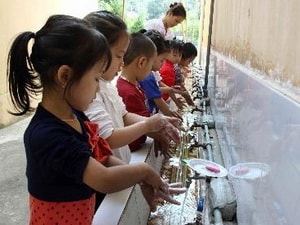Washing hands with soap reduces the risk of diarrhea by 35%.
The World Health Organization (WHO) recommends that just one act of washing hands can reduce the transmission of bacteria that cause diarrhea by up to 35%.

Kindergarten students wash their hands with soap before eating.
(Photo: Quy Trung/VNA)
To prevent gastrointestinal diseases, acute respiratory infections (cholera, influenza A/H5N1, H1N1...), especially hand, foot and mouth disease which is breaking out and at risk of spreading widely, experts from the World Health Organization have also given practical advice to always keep your hands clean.
According to the Department of Health Environment Management, the Ministry of Health conducted a survey on "Changes in knowledge and behavior related to hand washing with soap" in 15 communes in 5 provinces with communication intervention (from June to July 2011): in the districts of Ha Tay (old), Ha Nam, Hai Phong, Thanh Hoa and Ha Tinh. The purpose was to evaluate the effectiveness of the intervention of the project "Improving community health" supported by the Ministry of Health in collaboration with the Unilever Vietnam Fund.
Here, researchers observed the handwashing behavior of 390 children aged 6-15, 390 people aged 16-60 and 390 mothers with children under 5 years old in their households; in addition, they observed the current status of water sources, handwashing areas, soap, sanitation facilities... of the surveyed households and public places.
The survey results showed that the rate of students who knew they needed to wash their hands with soap before eating, after urinating and defecating at the end of the period increased by 46.7% compared to the first period. In addition, the corresponding increase in the adult group was 39%; the rate of students who practiced washing their hands with soap before eating increased by 49%; and in the adult group increased by 48.7%; after defecating in both groups also increased to 63.2% and 69.8%.
However, the survey results showed that the rate of children washing their hands with soap after urinating in the student group was still low in both the student and adult groups at 15.8%. However, the final survey results in mothers who washed their hands with soap before feeding their children at the end of the period were significantly higher than at the beginning of the period (2.6%).
The benefits of washing hands with soap are seemingly simple and can be done by anyone, but in reality, the number of people who regularly do it is still very low. According to WHO, washing hands with soap, this activity will guide children to have changes in awareness and behavior towards regularly washing hands with soap./.
(According to VNA) - M.D






